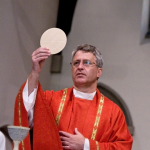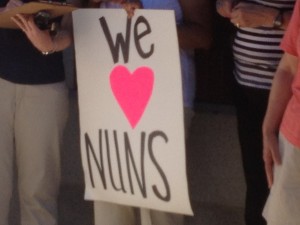 Did you know that last month the Catholic Church celebrated NFP Awareness Week? NFP, or Natural Family Planning, refers to methods for postponing (or achieving) pregnancy based upon observations of a woman’s body that inform her of the fertile and infertile phases of her cycle. Overlapping with the anniversary of Paul VI’s 1968 encyclical Humanae Vitae, NFP Awareness Week is, according to the U.S. Conference of Catholic Bishops, “a national educational campaign of the U.S. Conference of Catholic Bishops (USCCB) on the Catholic teaching on married love and the gift of human life. The annual campaign, which began in 2002, promotes awareness of Natural Family Planning (NFP) methods.” Continue reading
Did you know that last month the Catholic Church celebrated NFP Awareness Week? NFP, or Natural Family Planning, refers to methods for postponing (or achieving) pregnancy based upon observations of a woman’s body that inform her of the fertile and infertile phases of her cycle. Overlapping with the anniversary of Paul VI’s 1968 encyclical Humanae Vitae, NFP Awareness Week is, according to the U.S. Conference of Catholic Bishops, “a national educational campaign of the U.S. Conference of Catholic Bishops (USCCB) on the Catholic teaching on married love and the gift of human life. The annual campaign, which began in 2002, promotes awareness of Natural Family Planning (NFP) methods.” Continue reading
Category Archives: First Tags
A reader request: Research on Catholic Youth Ministry
 The blog has been quiet in August, but we will be posting again soon. Here is a request I received direct from a reader:
The blog has been quiet in August, but we will be posting again soon. Here is a request I received direct from a reader:
I read The Catholic Conversation blog frequently. I was hoping that you could point me in the direction of or help get the word out that we need some research about youth ministry, especially in Catholic parishes because I know that some of the statistics would differ among Catholic and non-Catholic church populations. I’m interested in things including, but not limited to, average attendance at youth groups, average age range (6-8th grade vs. high school), as well as correlation between a “youth Mass” or Sunday evening Mass and participation in youth group.
Anyone engaging in this type of research and/or interested in blogging on the topic, please e-mail me at bstarks@nd.edu
More on Women’s Religious Vocations
Apropos of Linda’s recent posts regarding women religious and vocations, the new Chair-elect of ASA’s Sociology of Religion section- Patricia Wittberg- weighed in on this very topic in an article in America.
Reporting on data from the 2009 NRVC-CARA study on recent vocations to the religious life (which Linda mentioned and linked to previously), the article does a nice job of highlighting the contemporary challenge facing religious orders, in general, in attracting vocations. It is probably worth noting that Patricia and her co-author, Mary Johnson, are both women religious and sociologists. As such, they use their empirical data to debunk simplistic popular views, which fail to grasp the complex reality of attracting women’s vocations in our current era. Some readers have criticized the piece itself as being misleading for stating too simply that almost equal numbers of women have been attracted to institutes in both conferences of women religious in the U.S. in recent years–without noting in the same paragraph that their are over four times as many LCWR orders as CMSWR orders in the study. This is an important qualification, but since the authors pointed out this very distribution in the paragraph prior, I don’t think they were misleading anyone. Perhaps a larger danger is that other commentators may fail to provide that same context. Continue reading
CSPRI now on Twitter
 For all of you readers who have twitter accounts and “tweet.” At the suggestion of David Yamane (Wake Forest), I have pushed forward and created a twitter account for CSPRI:
For all of you readers who have twitter accounts and “tweet.” At the suggestion of David Yamane (Wake Forest), I have pushed forward and created a twitter account for CSPRI:
For now, I will be tweeting blog posts on this account, and if you use Twitter, you can follow us either through the link above or by clicking on the “follow me” bird now showing up on the side of our blog.
If readers have additional suggestions for CSPRI and/or the blog, please e-mail me. Also, I am compiling an e-mail list for when CSPRI sends out research reports and summaries. If you would like to be on this list, please e-mail your address to bstarks@nd.edu and simply ask to be added to our list.
(Lack of) Support for Women’s Vocations among Lay Catholics
As I mentioned in my last blog post, women religious have been a popular topic of late, with numerous Catholics and non-Catholics alike expressing their support for nuns and sisters in the U.S. in wake of the LCWR doctrinal assessment and the “Nuns on the Bus” tour. Despite the popularity of women religious among many Americans, data show a relative lack of support for women’s religious vocations. Below, I provide a chart detailing attitudes of American Catholics with regards to encouraging young Catholic women to enter religious life. Data come from the Spring 2006 Contemporary Catholic Trends Survey. Continue reading
The Popularity of Women Religious in the U.S.
Since the Congregation for the Doctrine of the Faith released its doctrinal assessment of the LCWR in April, women religious in the U.S. have been the subject of a plethora of news stories. Such attention has come not only from Catholic media sources, but has pervaded the secular media as well. A quick online search reveals well over a thousand news stories, and now there is even a website dedicated to disseminating coverage of American women religious. Similarly, the recent Nuns on the Bus campaign by the liberal Catholic organization Network has drawn much attention from both mainstream and Catholic media, even seeing support from numerous members of the U.S. Congress. Network’s Executive Director, Sr. Simone Campbell, has likewise made appearances on major media outlets, including the popular Colbert Report. Women religious have suddenly gained the attention of many. Continue reading
Question: Ministry “burn out”
 Today, I was speaking with an FJV (Former Jesuit Volunteer) who volunteered with me in the Midwest province back in 2003-04. He’s in town for ND Vision as a youth minister and is serving at a thriving parish in Ohio. We talked about many things, but one item that came up was the issue of “burn out” in youth ministry. In his eighth or ninth year of youth ministry now, he suggested that the average tenure of youth ministers is something closer to 2 years and that in order to keep going he had been forced to learn how to get past being “burned out.” This made me wonder, is there any good research on burn out among youth ministers? I know there’s research on clergy burn out, but have not heard of anything that examined youth ministers.
Today, I was speaking with an FJV (Former Jesuit Volunteer) who volunteered with me in the Midwest province back in 2003-04. He’s in town for ND Vision as a youth minister and is serving at a thriving parish in Ohio. We talked about many things, but one item that came up was the issue of “burn out” in youth ministry. In his eighth or ninth year of youth ministry now, he suggested that the average tenure of youth ministers is something closer to 2 years and that in order to keep going he had been forced to learn how to get past being “burned out.” This made me wonder, is there any good research on burn out among youth ministers? I know there’s research on clergy burn out, but have not heard of anything that examined youth ministers.
So, I am asking here on The Catholic Conversation–do you know of any good research on burn out in youth ministry (or ministry generally)? Even beyond research, are there any good practical books about dealing with burn out in youth ministry?
Why We Should Think About What We Buy and What We Drive
 One of the most difficult tasks a pastor, pastoral associate, or director of religious education faces involves dealing with social justice topics. Objections quickly multiply to their inclusion in congregational life: “It’s all too political!” “Everyone has their own personal opinion!” “It’s too hard to respond to such issues.”
One of the most difficult tasks a pastor, pastoral associate, or director of religious education faces involves dealing with social justice topics. Objections quickly multiply to their inclusion in congregational life: “It’s all too political!” “Everyone has their own personal opinion!” “It’s too hard to respond to such issues.”
And if social justice is difficult to embrace when we are discussing local concerns, it can be even harder when we try to speak of global concerns involving “distant others.” These are the people who make our clothing, pick our fruits and vegetables, and immigrate as economic changes eject them from their countries. Continue reading
Does stewardship work?
 There is a common perception among leaders in the Catholic Church, both clerical and lay, that the promotion of stewardship is highly desirable. In addition to stemming from a positive theology, this perception is based upon the assumption that stewardship makes an important difference in the life of a parish, resulting in an increase in time, talent, and treasure. There is a dearth of solid methodological research, however, that addresses the key research question: Does stewardship actually work at the parish level? Continue reading
There is a common perception among leaders in the Catholic Church, both clerical and lay, that the promotion of stewardship is highly desirable. In addition to stemming from a positive theology, this perception is based upon the assumption that stewardship makes an important difference in the life of a parish, resulting in an increase in time, talent, and treasure. There is a dearth of solid methodological research, however, that addresses the key research question: Does stewardship actually work at the parish level? Continue reading
Commitment to the Poor: One of The Fruits of Eucharistic Celebration
 This morning, I was at a talk given by Jen and Brian Suehs-Vassel entitled: “The Fruits of Eucharistic Celebration.” The talk was part of the Center for Liturgy’s Summer Symposium, “The Eucharist: Become What You Receive, Receive What You Are.” Using the wonderful imagery of the disciples encountering Christ on the road to Emmaus and this leading them to return to Jerusalem out of love, they asked if we are Christbearers in our own lives. Do we bear Christ to the world with love? Continue reading
This morning, I was at a talk given by Jen and Brian Suehs-Vassel entitled: “The Fruits of Eucharistic Celebration.” The talk was part of the Center for Liturgy’s Summer Symposium, “The Eucharist: Become What You Receive, Receive What You Are.” Using the wonderful imagery of the disciples encountering Christ on the road to Emmaus and this leading them to return to Jerusalem out of love, they asked if we are Christbearers in our own lives. Do we bear Christ to the world with love? Continue reading
